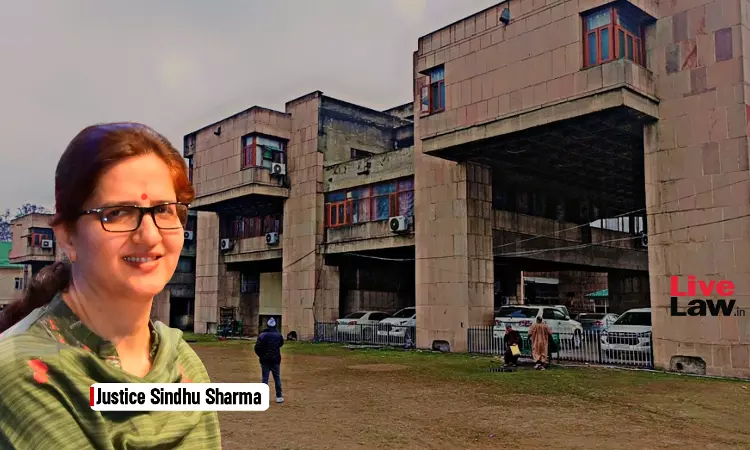- Home
- /
- High Courts
- /
- High Court of J & K and Ladakh
- /
- Impounding Passport Without...
Impounding Passport Without Chargesheet Violates Fundamental Rights, Only FIR Does Not Constitute 'Pending Proceedings': J&K High Court
LIVELAW NEWS NETWORK
5 Jun 2025 10:23 AM IST
Reaffirming the sanctity of constitutional rights, the High Court of Jammu and Kashmir and Ladakh has ruled that mere registration of a criminal case does not amount to proceedings prescribed under clause (e) of Section 10(3) of the Passports Act. Justice Sindhu Sharma observed that for proceedings to be treated as pending before a criminal court, a chargesheet must be filed, and not merely...
Reaffirming the sanctity of constitutional rights, the High Court of Jammu and Kashmir and Ladakh has ruled that mere registration of a criminal case does not amount to proceedings prescribed under clause (e) of Section 10(3) of the Passports Act. Justice Sindhu Sharma observed that for proceedings to be treated as pending before a criminal court, a chargesheet must be filed, and not merely an FIR.
These observations came in a writ petition filed by retired IAS officer Sajad Ahmad Khan, challenging the refusal to release his passport by the Special Judge, Anti-Corruption (CBI Cases), Jammu, and the subsequent impounding order passed by the Regional Passport Officer, Srinagar.
Background:
The petitioner, was subjected to a CBI investigation in FIR concerning the alleged illegal issuance of arms licenses by several Deputy Commissioners in Jammu & Kashmir between 2012–2016. During a search of his premises in October 2021, his passport, mobile phones, and a decades-old gift deed were seized.
Despite cooperating fully with the investigation and making multiple representations for the return of his passport, the authorities impounded the same without issuing a formal show-cause notice, citing a “security threat to India” under Section 10(3)(c) of the Passports Act.
Khan, intending to undertake a religious pilgrimage, sought judicial redress after his application for passport release was rejected by the CBI court on September 11, 2024. Advocate Areeb Javed Kawoosa, argued that Khan's passport had remained in official custody for over three years and was not required for any ongoing investigation.
Submitting that his client was not charged with any offence prejudicial to national security, he submitted that the petitioner wished only to travel to Mecca and Medina for Haj or Umrah. It was also contended that the denial of passport infringed upon the petitioner's fundamental right to travel abroad, protected under Article 21 of the Constitution of India.
The CBI and other respondents opposed the plea, submitting that two FIRs had revealed the petitioner's role in a conspiracy to issue arms licenses illegally in exchange for bribes. He was alleged to have colluded with gun dealers while serving as Deputy Commissioner, Poonch. While sanction for prosecution had been sought on October 30, 2023, no chargesheet had yet been filed.
The government argued that releasing the passport could risk the petitioner evading future proceedings.
Court's Observations:
In order to arrive at a just adjudication of the matter Justice Sharma delved into constitutional jurisprudence and statutory interpretation under the Passports Act, 1967.
Citing precedents such as Satwant Singh Sawhney v. D. Ramarathnam (AIR 1967 SC 1836), Maneka Gandhi v. Union of India (1978), and Satish Chandra Verma v. UOI (2019), the Court emphasized that the right to travel abroad is an inherent facet of the right to life and personal liberty. It can only be restricted by following a just, fair, and reasonable procedure established by law, the bench underscored.
The Court took exception to the RPO's invocation of Section 10(3)(c) without placing any concrete material to show how the petitioner posed a “security threat” or endangered India's sovereignty. It noted that the CBI had, in fact, recommended action under Section 10(3)(e), which applies only where proceedings are pending before a criminal court.
Importantly, the Court held,
“.. mere pendency of the investigation would not give power to the authorities to impound the passport under Section 10(3)(e). Since mere registration of the FIR by the investigation agency is also no ground for refusal to issue, renew or impound the passport. It is only upon the filing of a charge sheet and the court taking cognizance of the offence that it may be said that a criminal case is actually pending”
Referring to Venkatesh Kandasamy v. Union of India (AIR 2015 Mad 3) and Manish Kumar Mittal v. Chief Passport Officer, the Court clarified that “pending proceedings” under Section 10(3)(e) begin only when cognizance is taken by the court, i.e., when a chargesheet is filed.
The Court also condemned the lack of adherence to natural justice, noting that no proper hearing or formal notice had been served to the petitioner before impounding his passport, as required under Section 10(5) of the Act.
It added,
“.. the impugned order has been passed following the principles of natural justice. The respondents have not provided opportunity of hearing to the petitioner. The respondents then issue e-mail to the petitioner that his passport has been suspended for the reason security threat to India”
Holding that the order impounding the passport was neither legally sustainable nor procedurally valid, the High Court allowed the writ petition. Justice Sindhu Sharma directed the RPO to “pass an appropriate order either to release the passport or issue a fresh passport after completion of all formalities.”
APPEARANCES:
For Petitioner: Mr. Areeb Javed Kawoosa, Advocate
For Respondents: Mr. Vishal Sharma, DSGI Ms. Mrinal, Advocate vice Mrs. Monika Kohli, Sr. AAG
Case Title: Sajad Ahmad Khan Vs Union of India & Ors
Citation: 2025 LiveLaw (JKL) 221



